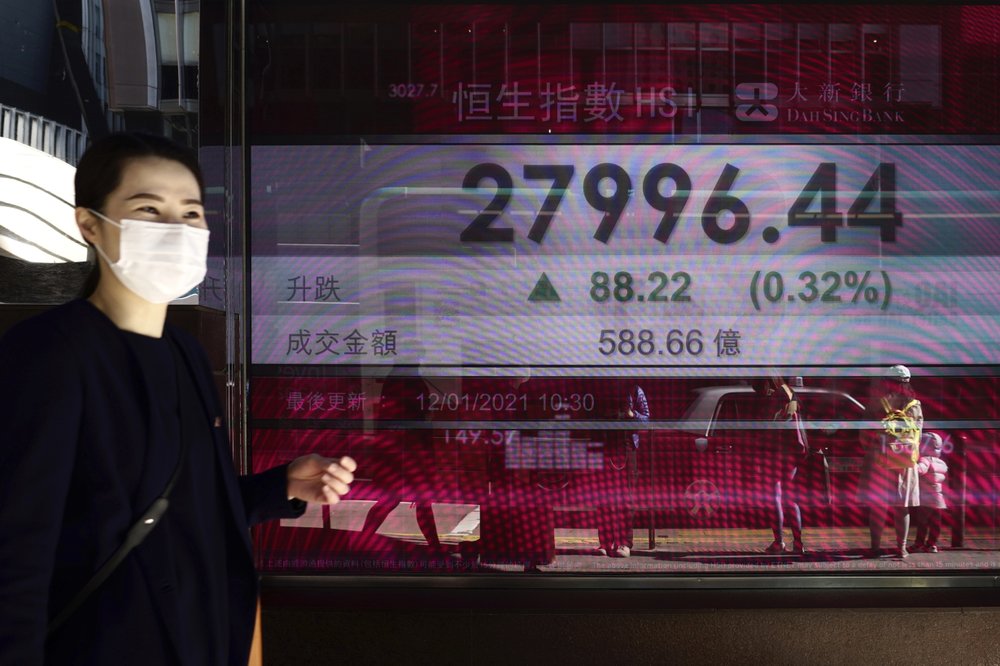

Asian stocks advanced Tuesday as investors watched for details of President-elect Joe Biden’s promised economic stimulus plan.
Shanghai, Tokyo and Hong Kong, which account for the bulk of the region’s stock value, rose. Seoul, Sydney and Southeast Asian markets retreated.
Overnight, Wall Street declined following a string of record-setting gains.
Investors were encouraged by U.S. election results that showed Biden’s Democratic Party will control the Senate, reducing potential opposition to his plans. Biden promised to announce details this week of the plan he will propose after he takes office Jan. 20.
“Investors found optimism in the prospect of further fiscal stimulus,” said Cesar Perez Ruiz of Pictet Wealth Management in a report. With the Senate in Democratic hands, “President-elect Biden has a better chance of pushing through his agenda and delivering sorely-needed stimulus and support.”
No major potentially market-moving events were on the calendar Tuesday in Asia.
The Shanghai Composite Index rose 1.4% to 3,580.95 and the Nikkei 225 in Tokyo added 0.1% to 28,164.34. The Hang Seng in Hong Kong gained 0.8% to 28,117.37.
The Kospi in Seoul shed 0.8% to 3,125.72 while the S&P-ASX 200 in Sydney sank 0.3% to 6,679.10.
India’s Sensex opened down 0.1% at 49,214.12. New Zealand and Southeast Asian markets retreated.
Overnight, Wall Street’s benchmark S&P 500 index declined 0.7% to 3,799.61, breaking a four-day streak of gains. The Dow Jones Industrial Average retreated 0.3% to 31,008.69. The Nasdaq composite slid 1.3% to 13,036.43.
U.S. markets shrugged off the attack on the Capitol in Washington by Trump supporters who were trying to block final confirmation of Biden’s victory.
“I believe stocks were looking ahead to better days, expecting a robust economic recovery once there is broad distribution of vaccines,” said Kristina Hooper of Invesco in a report.
The market’s record-setting run means stocks and other investments are even more expensive, leaving critics to say they’ve gone too high.
Stocks in the S&P 500 are trading at roughly 29 times their earnings, well above their average of 18 times over the past decade.
The gains come despite negative U.S. economic news. Employers cut more jobs last month than they added for the first time since the start of the pandemic last spring.
The United States and other countries also face potentially more contagious types of the coronavirus. That is prompting governments to reimpose restrictions that disrupt travel and commerce.
Democrats are pushing for the removal of Trump, who has less than two weeks left in his term, after he helped to incite loyalists who stormed the Capitol.
Shares of Twitter slid 6.4% for one of the largest losses in the S&P 500 after it banned Trump from his account and his 89 million followers. Twitter cited “the risk of further incitement of violence,” but the move has drawn a lot of anger from conservatives who may abandon the service and ask for more regulatory scrutiny of the company. Facebook fell 4% after it suspended Trump’s accounts.
In energy markets, benchmark U.S. crude gained 13 cents to $52.38 per barrel in electronic trading on the New York Mercantile Exchange. The contract rose 1 cent on Monday to $52.25. Brent crude, used to price international oils, advanced 9 cents to $55.75 per barrel in London. It fell 33 cents the previous session to $55.66 a barrel.
The dollar rose to 104.22 yen from Monday’s 104.16. The euro fell to $1.2154 from $1.2163.